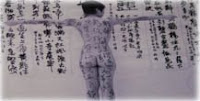





Tattooing was practiced by the Egyptians as early as 2000 ac many peoples adopted the practice for adornment .The natives of Africa and the pacific islands regard tattooing as a religious and social significance Color tattooing among maoris was highly developed and was popular in China India and Japan Tattoos applied with Tattoos applied with a needle can be taken off with a laser beam but only in recent years from the new technology. Method of tattooing is by decorating the skin using a sharp instrument or needle piercing the flesh gently in a pattern or writing what ever has been chosen wiping away any blood and then coloured pigment of red and blue is rubbed into the wounds so producing the required design In modern times electric needles are used to do the piercing and a solution to disinfect the wounds.
Early Japanese Horimono tattoo in 1980 showing influence of Suikoden novel
This picture was done in Beijing by a leading artist who specialized in Shufa these inscriptions are from poems written in the 12 & 13 centuries
Japanese full body suits mostly made from woodcut design from the 1800’s
Ancient ethic minorities in china had customs that were not tolerated by main steam society only existed along the insolated areas in the mountains the drung people one of the tribes in the ming dynasty 350yrs ago were being attacked by neighbouring tribes and they were stealing their wemon . drung wemon had their faces tattooed to make them look ugly the girls of 10-12 would be done by dipping bamboo slip into sooty water draw on the face then beaten a thorn into the face then fill with the wholes with soot then scabs formed and fell off the dark blue pattern was left forming a butterfly design.
Towards the end of the 17th century the skin be came a medium for indelible vows or religious prayers the customs of wearing professions of eternal effections on the inside of the arms or on the thigh became widespread buddhist monks and devout laymen had prayers written on their backs in calligraphy the tattoo had now become a decorative element
The men in this picture show their devotion by having their backs tattooed with dragon inscriptions by their master.
Bibliography
www.tattoosheaven.com/centasia.html
www.designboom.com/history/tattoo_history.html
www.tattoo.ufmom-net/?p=37
http://tattoojoy.com/tattoo-history/japan.htm
www.tattoo.dk/engelske/tattoo-history/asia/e-asia.htm
books
Skins shows – the tattoo bible by Chris Wroblewski from Tweed heads library
Secorated skin by Karl Groning from Tweed heads library
Funk and wagnalls new encyclopedia book22 home library
No comments:
Post a Comment